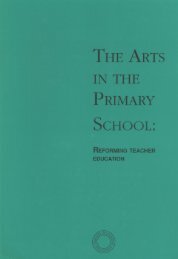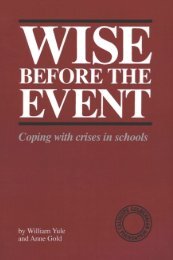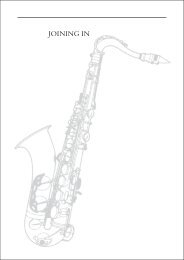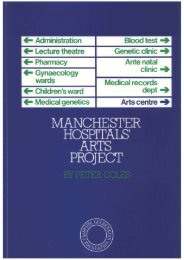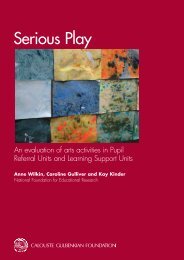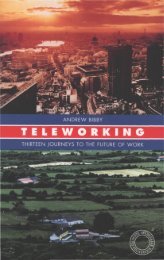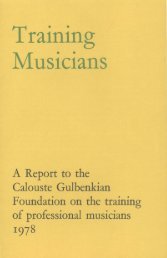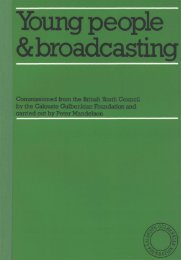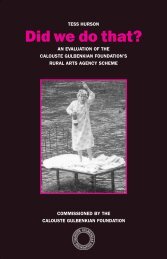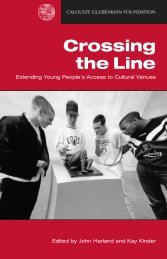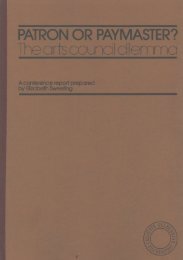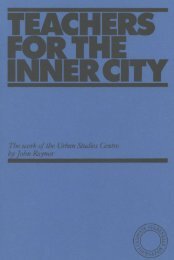The Arts in Schools - Calouste Gulbenkian Foundation
The Arts in Schools - Calouste Gulbenkian Foundation
The Arts in Schools - Calouste Gulbenkian Foundation
- No tags were found...
You also want an ePaper? Increase the reach of your titles
YUMPU automatically turns print PDFs into web optimized ePapers that Google loves.
Foreword by the Chairman of the Inquiry<strong>The</strong> <strong>Calouste</strong> <strong>Gulbenkian</strong> <strong>Foundation</strong>, Lisbon, operates three programmes<strong>in</strong> the United K<strong>in</strong>gdom through its United K<strong>in</strong>gdom Branch. <strong>The</strong>se cover thearts, education and social welfare. With<strong>in</strong> each programme are carefullydef<strong>in</strong>ed priorities set out and expla<strong>in</strong>ed <strong>in</strong> the Branch's annual report. <strong>The</strong>priorities vary from time to time but provide a framework for the <strong>Foundation</strong>'stw<strong>in</strong> functions of respond<strong>in</strong>g to applications and launch<strong>in</strong>g <strong>in</strong>itiativeson its own behalf.<strong>The</strong>se functions require the officers of the Branch to ma<strong>in</strong>ta<strong>in</strong> contactwith a wide range of op<strong>in</strong>ion — from <strong>in</strong>dividual artists and social activists toelected representatives <strong>in</strong> central and local government, M<strong>in</strong>isters and othernational leaders.At one such meet<strong>in</strong>g, early <strong>in</strong> 1977, Peter Newsam, Education Officer ofthe Inner London Education Authority, and I were discuss<strong>in</strong>g the publicdebate on education, particularly references to a core curriculum and arecurrent emphasis on the three Rs. <strong>The</strong>se seemed to exclude, not only thearts, but also some of the pr<strong>in</strong>ciples upon which the idea of a general educationhad been developed <strong>in</strong> Brita<strong>in</strong> s<strong>in</strong>ce the Education Act of 1944. If ourassessment was correct, these public discussions would have profoundimplications for all education. Both of us saw the arts as a test case <strong>in</strong> thisrespect. We agreed that it was important to pursue these issues, but only ifsuch an <strong>in</strong>quiry were undertaken by an <strong>in</strong>dependent body. We had <strong>in</strong> m<strong>in</strong>da review of the national situation, draw<strong>in</strong>g on the experience and viewsof an advisory committee represent<strong>in</strong>g a cross-section of educational <strong>in</strong>terestsand responsibility.<strong>The</strong> Board of the <strong>Calouste</strong> <strong>Gulbenkian</strong> <strong>Foundation</strong> <strong>in</strong> Lisbon approvedthe <strong>in</strong>itiation of the Inquiry and the Advisory Committee first met <strong>in</strong> September1978. Early <strong>in</strong> 1979, whilst work<strong>in</strong>g on the first draft of the report,the significance of our work seemed to be chang<strong>in</strong>g under pressure of economiesalready <strong>in</strong>troduced by the Labour Government. We appo<strong>in</strong>teda draft<strong>in</strong>g committee to assess the changes: Dr. Ken Rob<strong>in</strong>son, ProfessorDavid Asp<strong>in</strong> and Professor John Allen jo<strong>in</strong>ed Nicholas Usherwood and me.By early 1980 the effects of the Conservative Government's educationalpolicies began to be revealed as more far-reach<strong>in</strong>g than at first thought. <strong>The</strong>IX



